Ace prep Exams
On this page, you find all documents, package deals, and flashcards offered by seller rickyenzo329.
- 521
- 0
- 8
Community
- Followers
- Following
528 items
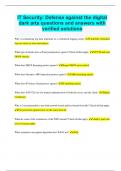
IT Security: Defense against the digital dark arts questions and answers with verified solutions
Why is normalizing log data important in a centralized logging setup? Uniformly formatted logs are easier to store and analyze What type of attacks does a flood guard protect against? Check all that apply. SYN Floods and DDOS Attacks What does DHCP Snooping protect against? Rogue DHCP server attack What does Dynamic ARP Inspection protect against? ARP poisoning attacks What does IP Source Guard protect against? IP spoofing attacks What does EAP-TLS use for mutual authentication of both th...
- Exam (elaborations)
- • 8 pages •
Why is normalizing log data important in a centralized logging setup? Uniformly formatted logs are easier to store and analyze What type of attacks does a flood guard protect against? Check all that apply. SYN Floods and DDOS Attacks What does DHCP Snooping protect against? Rogue DHCP server attack What does Dynamic ARP Inspection protect against? ARP poisoning attacks What does IP Source Guard protect against? IP spoofing attacks What does EAP-TLS use for mutual authentication of both th...
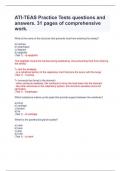
ATI-TEAS Practice Tests questions and answers. 31 pages of comprehensive work.
What is the name of the structure that prevents food from entering the airway? a) trachea b) esophagus c) diagram d) epiglottis (Test 1) - d) epiglottis "the epiglottis covers the trachea during swallowing, thus preventing food from entering the airway" ?= aka the windpipe - is a cylindrical portion of the respiratory tract that joins the larynx with the lungs (Test 1) - Trachea ?= connects the throat to the stomach - when someone swallows, this contracts to force the food down int...
- Exam (elaborations)
- • 31 pages •
What is the name of the structure that prevents food from entering the airway? a) trachea b) esophagus c) diagram d) epiglottis (Test 1) - d) epiglottis "the epiglottis covers the trachea during swallowing, thus preventing food from entering the airway" ?= aka the windpipe - is a cylindrical portion of the respiratory tract that joins the larynx with the lungs (Test 1) - Trachea ?= connects the throat to the stomach - when someone swallows, this contracts to force the food down int...
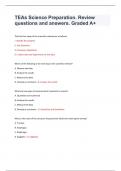
TEAs Science Preparation. Review questions and answers. Grade
The first four steps of the scientific method are as follows: I. Identify the problem II. Ask Questions III. Develop a hypothesis IV. Collect data and experiment on that data Which of the following is the next step in the scientific method? A. Observe the data B. Analyze the results C. Measure the data D. Develop a conclusion - B. Analyze the results What are two types of measurement important in science? A. Quantitive and numerical B. Analyze the results C. Measure the data D. Dev...
- Package deal
- Exam (elaborations)
- • 16 pages •
The first four steps of the scientific method are as follows: I. Identify the problem II. Ask Questions III. Develop a hypothesis IV. Collect data and experiment on that data Which of the following is the next step in the scientific method? A. Observe the data B. Analyze the results C. Measure the data D. Develop a conclusion - B. Analyze the results What are two types of measurement important in science? A. Quantitive and numerical B. Analyze the results C. Measure the data D. Dev...
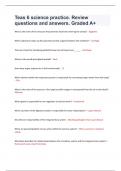
Teas 6 science practice. Review questions and answers. Graded A+
What is the name of the structure that prevents food from entering the airway? - Epiglottis Which substance makes up the pads that provide support between the vertebrae? - Cartilage The two criteria for classifying epithelial tissue are cell layers and ______ - Cell shape Where is the parathyroid gland located? - Neck How many organ systems are in the human body? - 11 Which element within the respiratory system is responsible for removing foreign matter from the lungs? - Cilia What is the...
- Package deal
- Exam (elaborations)
- • 8 pages •
What is the name of the structure that prevents food from entering the airway? - Epiglottis Which substance makes up the pads that provide support between the vertebrae? - Cartilage The two criteria for classifying epithelial tissue are cell layers and ______ - Cell shape Where is the parathyroid gland located? - Neck How many organ systems are in the human body? - 11 Which element within the respiratory system is responsible for removing foreign matter from the lungs? - Cilia What is the...
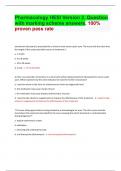
Pharmacology HESI Version 2. Question with marking scheme answers. 100% proven pass rate
Isotretinoin (Accutane) is prescribed for a client to treat severe cystic acne. The nurse tells the client that the length of the usual prescribed course of treatment is: a. 1 month b. 4 to 8 weeks c. 15 to 20 weeks d. 1 year - c. 15 to 20 weeks A clinic nurse provides instructions to a client who will be taking isotretinoin (Accutane) for severe cystic acne. Which statement by the client indicates the need for further instructions? a. I need to return to the clinic for a blood test to c...
- Exam (elaborations)
- • 6 pages •
Isotretinoin (Accutane) is prescribed for a client to treat severe cystic acne. The nurse tells the client that the length of the usual prescribed course of treatment is: a. 1 month b. 4 to 8 weeks c. 15 to 20 weeks d. 1 year - c. 15 to 20 weeks A clinic nurse provides instructions to a client who will be taking isotretinoin (Accutane) for severe cystic acne. Which statement by the client indicates the need for further instructions? a. I need to return to the clinic for a blood test to c...
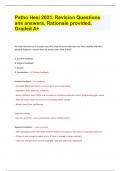
Patho Hesi 2021. Revision Questions ans answers. Rationale provided. Graded A+
An initial disturbance in a system sets off a chain of events that does not favor stability and often abruptly displaces a system from its steady state: what is that? A. positive feedback B. negative feedback C. disease D. homeostasis - A. Positive feedback Positive Feedback - -less common - Snowball Effect (some pain/ pressure gets worse and worse) - examples: clots, sneezing, childbirth - when childbirth starts there is an increase in hormone production which progressively gets worse ...
- Package deal
- Exam (elaborations)
- • 60 pages •
An initial disturbance in a system sets off a chain of events that does not favor stability and often abruptly displaces a system from its steady state: what is that? A. positive feedback B. negative feedback C. disease D. homeostasis - A. Positive feedback Positive Feedback - -less common - Snowball Effect (some pain/ pressure gets worse and worse) - examples: clots, sneezing, childbirth - when childbirth starts there is an increase in hormone production which progressively gets worse ...
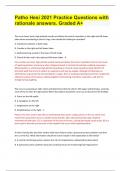
Patho Hesi 2021 Practice Questions with rationale answers. Graded A+
The nurse hears short, high-pitched sounds just before the end of inspiration in the right and left lower lobes when auscultating a client's lungs. How should this finding be recorded? A. Inspiratory wheezes in both lungs B. Crackles in the right and left lower lobes C. Abdominal lung sounds in the bases of both lungs D. Pleural friction rub in the right and left lower lobes - B Fine crackles are short, high pitched sounds heard just before the end of inspiration that are the result of r...
- Package deal
- Exam (elaborations)
- • 19 pages •
The nurse hears short, high-pitched sounds just before the end of inspiration in the right and left lower lobes when auscultating a client's lungs. How should this finding be recorded? A. Inspiratory wheezes in both lungs B. Crackles in the right and left lower lobes C. Abdominal lung sounds in the bases of both lungs D. Pleural friction rub in the right and left lower lobes - B Fine crackles are short, high pitched sounds heard just before the end of inspiration that are the result of r...
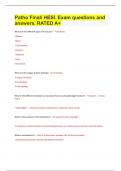
Patho Final/ HESI. Exam questions and answers. RATED A+
Patho Final/ HESI. Exam questions and answers. RATED A+ What are the different types of fractures? - -Transverse -Oblique -Spiral -Comminuted -Avulsion -Impacted -Torus -Greenstick What are the stages of bone healing? - 1) hematoma 2) callus formation 3) ossification 4) remodeling What is the difference between a traumatic fracture and pathologic fracture? - -*trauma* --> direct injury -*pathologic* --> disease process; osteoporosis, metastatic bone cancer What is the purp...
- Package deal
- Exam (elaborations)
- • 24 pages •
Patho Final/ HESI. Exam questions and answers. RATED A+ What are the different types of fractures? - -Transverse -Oblique -Spiral -Comminuted -Avulsion -Impacted -Torus -Greenstick What are the stages of bone healing? - 1) hematoma 2) callus formation 3) ossification 4) remodeling What is the difference between a traumatic fracture and pathologic fracture? - -*trauma* --> direct injury -*pathologic* --> disease process; osteoporosis, metastatic bone cancer What is the purp...
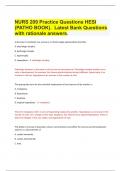
NURS 209 Practice Questions HESI (PATHO BOOK). Latest Bank Questions with rationale answers.
NURS 209 Practice Questions HESI (PATHO BOOK). Latest Bank Questions with rationale answers. A decrease in workload, use, pressure, or blood supply appropriately describes: A. physiologic atrophy. B. pathologic atrophy. C. hypertrophy. D. hyperplasia. - B. pathologic atrophy. Pathologic atrophy is a decrease in cell size due to decreased use. Physiologic atrophy usually occurs early in development; for example, the thymus gland atrophies during childhood. Hypertrophy is an increase in ...
- Package deal
- Exam (elaborations)
- • 88 pages •
NURS 209 Practice Questions HESI (PATHO BOOK). Latest Bank Questions with rationale answers. A decrease in workload, use, pressure, or blood supply appropriately describes: A. physiologic atrophy. B. pathologic atrophy. C. hypertrophy. D. hyperplasia. - B. pathologic atrophy. Pathologic atrophy is a decrease in cell size due to decreased use. Physiologic atrophy usually occurs early in development; for example, the thymus gland atrophies during childhood. Hypertrophy is an increase in ...
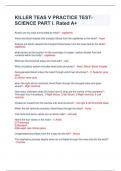
KILLER TEAS V PRACTICE TESTSCIENCE PART I. Rated A+
KILLER TEAS V PRACTICE TESTSCIENCE PART I. Rated A+ Alveoli are tiny sacs surrounded by what? - capillaries Veins are blood vessels that transport blood from the capillaries to the what? - heart Arteries are blood vessels that transport blood away from the heart and to the what? - capillaries what serves as the location for the exchange of oxygen, carbon dioxide fluid and nutrients within the body? - capillaries What are the bronchial tubes are lined with? - cilia What circulatory system...
- Package deal
- Exam (elaborations)
- • 18 pages •
KILLER TEAS V PRACTICE TESTSCIENCE PART I. Rated A+ Alveoli are tiny sacs surrounded by what? - capillaries Veins are blood vessels that transport blood from the capillaries to the what? - heart Arteries are blood vessels that transport blood away from the heart and to the what? - capillaries what serves as the location for the exchange of oxygen, carbon dioxide fluid and nutrients within the body? - capillaries What are the bronchial tubes are lined with? - cilia What circulatory system...
